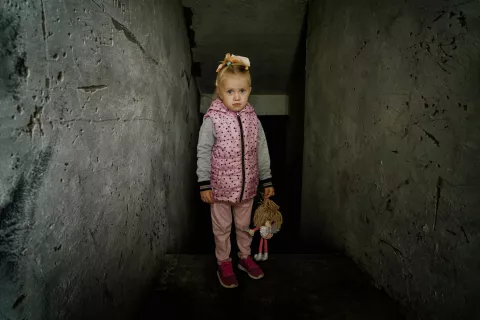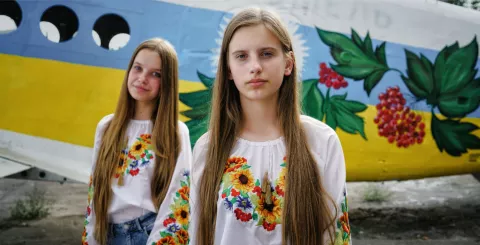“My place is here”
As families’ lives are upended by war in Ukraine, child protection specialists such as Olga are helping fleeing mothers and their children cope with trauma, loss and an uncertain future.

Olga has just received a call on her mobile phone from a woman travelling from Kharkiv, in northeastern Ukraine. “Her husband died on the frontline. She’s only just found out,” Olga says.

Olga leads a mobile team providing support to families who have fled to her hometown of Uzhhorod, in western Ukraine, because of the war. Equipped with mobile phones and identifying vests, the mobile support teams walk the streets of Uzhhorod, located near the border with Slovakia, responding to calls and providing psychosocial and other support to the hundreds of families – mainly children and women – who have arrived from the east of the country.

On the way to Uzhhorod station to meet the bereaved woman, Olga reflects on how each person reacts differently to the news that they have lost a loved one. “Some are just silent and stare blankly, some deny reality,” she says. “Others get aggressive and shout.”

“My job in those first moments after hearing the news is to take them to a quiet place, listen, understand their feelings and try to empathize with them,” Olga explains. “Most are widowed and traumatized mothers trying to process a new reality without their husbands or children.”

The woman who called from the train station says that she appreciates Olga’s help, but she’s not sure what to do now. She wants to return home, find the body of her husband and say a final goodbye to him.
It’s the kind of conversation that has become all too familiar for Olga and her team since the war began in late February. In the weeks and months since, she has been working alongside a doctor, social workers and a driver bringing comfort and support for those arriving in her city.
“We are united by the duty to help our people. We are together every night,” Olga says of her team, which is supported by UNICEF. Before going to sleep each night, team members check their shared WhatsApp group for guidance from Olga on what needs to be done the following day.

Before the war, Olga was a preschool teacher, Aikido instructor and avid gardener. But on 25 February, the preschool called “to let me know that classes were temporarily suspended.”
Olga says that the same day, a friend sent a message that Kharkiv was being bombed. “I went directly to the city’s evacuation centre,” she says as preparations were made to receive displaced families fleeing the bombardment. “People arrived at the station hysterical. That’s how it all started. Since then, I haven’t stopped talking to traumatized families.”

Two weeks after the start of the war, Olga met a boy from Irpin, just outside Kyiv, who was struggling to express how he felt about what was happening. Every time he tried to talk, he would stutter and burst into tears. His mother said that a missile had exploded only metres from their home.
After mother and son started receiving therapy, Olga says it became clear that the mother’s stress was also affecting the boy. “I’ve been working with children for years and it’s incredible to see how they perceive and absorb the feelings and emotions of their parents,” Olga says.


The war in Ukraine is having a devastating impact on the mental health of Ukraine’s 7.5 million children. Many of the displaced children arriving at relatively safe locations such as Uzhhorod station are still deeply traumatized by the violence that they have witnessed. Fleeing families are terrified, in shock and desperate for safety. One hundred days into the conflict, more than 5 million children were in need of humanitarian assistance.

The surrounding mountainous terrain has meant that the region of Transcarpathia, where Uzhhorod is located, has become a haven for Ukrainians trying to escape shelling in other parts of the country. As a result, families fleeing other parts of Ukraine have been arriving daily by train or bus, sleeping in gyms and schools that have been converted into reception centres as they decide where to go next.

Olga’s team is one of almost 70 multidisciplinary mobile teams operating as part of the UNICEF-supported SPILNO centres. The teams, which consist of a social worker, psychologist, lawyer and nurse, focus on providing support to women, children, youth and persons with disabilities. Olga says she also emphasizes the importance of team members monitoring their own mental health.
“To help others, you have to be well yourself first,” she says. “That is a priority for us to work in these circumstances. In my case, I go to therapy and lean on my passion for nature. When I have a hard day, I go out to look at the stars or water the plants with my father. Since I was little, I’ve helped him in the garden. It relaxes me and helps me distract myself.”
But Olga is also aware of the difficult circumstances that the teams are operating under. “It’s hard in times of war when our friends and family are down, but we have to stick together and stay strong,” she says. “And when I see that a colleague is close to burning out, I ask them to rest and disconnect.”

By the middle of May, UNICEF and partners had reached more than 490,000 children and caregivers with mental health and psychosocial support, and provided case management and referral services to more than 45,000 children.

Many of those working on the mobile teams have had to say goodbye to family and friends who have fled to neighboring countries. But for now, in their place, are new families, ones brought together by a common desire to help those who have fled. These “families”, who met in shelters and train stations across the country, have formed tight bonds with a shared commitment to assist Ukrainian families whose lives have been completely upended.
“We’re very close. When someone loses hope, another one joins the team to support,” Olga says. “Tiredness takes a toll, but we aren’t going to leave our posts.”

As Olga finishes up a cup of coffee, she receives another call. “Tomorrow we expect a train full of families from Kramatorsk. I have to organize the team,” she says. “It’s my father's birthday, but he’ll understand that I can’t celebrate it with him.”
Tragically, that train never arrived. The following day, members of Olga’s team were sharing heartbreaking photos posted on a messaging app of the aftermath of an attack on a crowded station in eastern Ukraine. Olga hugs a woman who is crying after hearing the news. “Whenever I see a mother crying, I hug them tight,” Olga says. “It helps them to share your energy and strength. They need us more than ever.”




